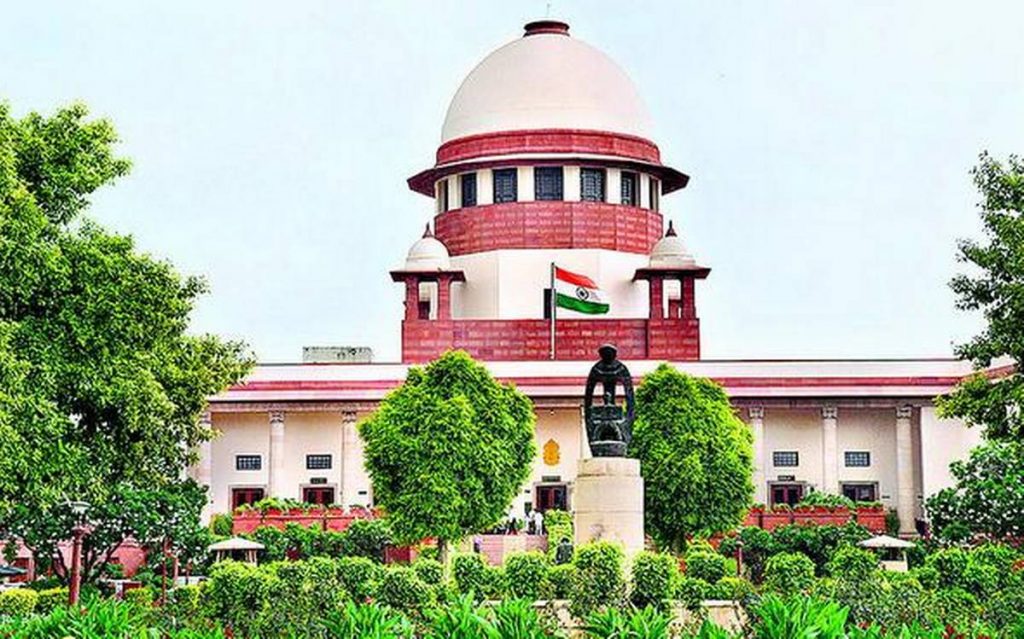Manas Dasgupta
NEW DELHI, Apr 27: Refusing to remain a “mute spectator” when the country was in the midst of a “national crisis,” the Supreme Court on Tuesday said its suo motu proceeding on devising national policy for COVID-19 management was not meant to supplant high court hearings.
A bench comprising Justices DY Chandrachud, L Nageswara Rao and S Ravindra Bhat, which is hearing the suo motu case taken up by it in relation to oxygen, medicines and vaccines against Covid-19, said it did not want to prevent any high court from exercising its power but would rather play a “complimentary role and help in issues they are not able to look into” due to jurisdictional limitations.
The bench said the high courts were in a better position to monitor the pandemic situation within their territorial boundaries and the apex court was playing a complementary role and its “intervention must be understood in the correct perspective” as there are some matters which transcend the regional boundaries.
There is a need for top court’s intervention on certain national issues as there might be matters related to coordination between States, it said.
“We are playing complementary role. If high courts have any difficulty in dealing with issues due to territorial limitations, we will help,” said the Bench.
These observations assume significance as some lawyers had criticised the apex court last Thursday for taking suo motu cognisance of the pandemic’s resurgence and issues by saying that high courts be allowed to continue with hearings.
A day later on April 23, a Bench headed by the then CJI S.A. Bobde, who has since retired, took a very strong exception to “unfair” criticism by some lawyers for “something which was not part of its order” in the suo motu case related to framing of national policy on the COVID-19 pandemic and said “this is how institution is being destroyed”.
The Bench on Tuesday also took note of the submissions of lawyers including senior advocate Vikas Singh on differential pricing of COVID-19 vaccines and asked the Centre to apprise it of the “rationale and basis” behind such pricing.
On the government’s decision to vaccinate all citizens above 18 years, the court sought replies from States by Thursday as to how they intend to cope with the surge in vaccine demand and the infrastructure required for that.
The Supreme Court also raised the issue of differential pricing of vaccines by different manufacturers and asked if something is being done about it. “Regarding pricing on vaccination different manufacturers is quoting in different prices. There are powers under Section 6 of Patents act. This is pandemic and a national crisis. If this is not there then please put all of this before hearing,” the SC said,
The SC also asked the Centre to file an affidavit stating the basis and rationale adopted in regard to the pricing of vaccines. The apex court said that the Centre should also mention the steps taken for enhancement of critical medical requirements, including Covid beds, and to ensure due availability of essential drugs including Remdesivir and Faviprivir.
The Bench asked the Centre to apprise the top court of the modalities on distribution of oxygen as well as the vaccines to States and the monitoring mechanism.
In the hearing, conducted via videoconferencing, the top court also appointed senior counsel Jaideep Gupta and Meenakshi Arora as amicus curiae to assist it in the COVID-19 management case as Harish Salve had sought recusal following some controversial remarks by some lawyers.
On April 22, the Bench took note of the pandemic situation due to sudden surge in COVID-19 cases as also in mortality and said it expected the Centre to come out with a “national plan” to deal with distribution of essential services and supplies, including oxygen and drugs.
Meanwhile, the Election Commission of India after causing enough damage to the health of the country by allowing the political parties a free run in the on-going state Assembly elections, on Tuesday issued an order banning “victory processions” by the winning candidates after the counting of votes on May 2.
After being held “singularly responsible” for the second wave of the pandemic in the country by the Madras High Court, the ECI on Tuesday said, “In view of the surge in COVID-19 cases throughout the country, the Commission has decided to make more stringent provision to be followed during the process of counting, in addition to exiting broad guidelines dated 21st August, 2020.”
In a letter to the Chief Electoral Officers of all States, it said no victory processions would be allowed after the counting of votes and only a maximum of two people would be allowed to accompany the winning candidate or their authorised representative to receive the certificate of election from the Returning Officer.
The ECI had issued guidelines for elections during the pandemic in August last year and then reiterated them during the latest Assembly elections.
BJP president J.P. Nadda welcomed the Election Commission’s order knowing well that the ECI’s writ automatically ends once the votes are counted and the election results notified after which the commission can not take any punitive action for violation of its orders.

